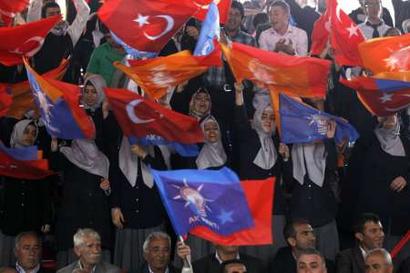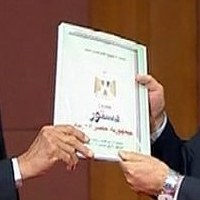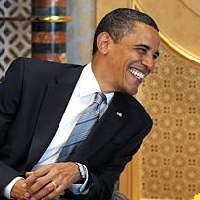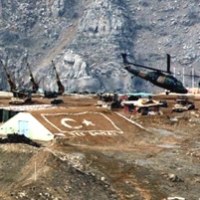![]()
Sun, May 08, 2011 | Cagaptay.com | By Soner Cagaptay, Hale Arifagaoglu and Gizem Kocver

Supporters of Turkey's ruling Justice and Development Party (AKP) wave national and party flags during a meeting in the southeastern Turkish city of Batman April 20, 2011. (REUTERS/Umit Bektas)
Turkey’s Threshold
This article was first printed in the Hurriyet Daily News. It’s reprinted here for your convenience.
Turkey faces what could be historic elections on June 12. Opinion polls suggest the ruling Justice and Development Party, or AKP, will win the polls for a third time since 2002. The question, though, is whether the AKP will win the required 2/3 legislative majority to singlehandedly draft a constitution for the country, ushering in key changes to Turkey’s political system since Ataturk created the country as a secular republic in the mold of Europe.
At this stage, whether the AKP can reshape Ataturk’s legacy depends on Turkey’s uniquely high percent electoral threshold. Electoral thresholds are common in multiparty democracies; in a system with dozens of parties, if all parties were to get into the parliament, a government would never be formed, so the smaller parties are kept out of the legislature.
But whereas most multiparty democracies have minimum thresholds for representation ranging from two to five percent of the popular vote, Turkey has the highest threshold among the liberal democratic countries, at ten percent.
This threshold originally aimed at preventing the Kurdish nationalist party from being able to serve in parliament. Since the law was enacted, the Kurdish nationalist party has had representation in every parliament, running independent candidates in some Kurdish provinces. Independents do not have to qualify for the national threshold but must simply gain enough support in their respective provinces to enter the parliament.
The law has not only been ineffective in its aims, it has led to other unintended consequences. Instead of preventing the Kurdish nationalist party from the parliament, the threshold has prevented smaller center-right and center-left parties from the legislature, resulting in the current polarization of the political system between the ruling AKP and opposition Republican People’s Party, or CHP.
Furthermore, the threshold distorts vox populi. By allocating so many of the seats that would have gone to the small parties to the winning AKP, the threshold has resulted in a governing party with many more seats that it would deserve based on its share of the votes. This has produced a majoritarian AKP. The governing party interprets its unrepresentative legislative majority as a blank check to trample on checks and balances, such as the courts and the media. As one analyst put it, the threshold has created an “AKP on steroids that acts like an elephant in democracy’s china shop.”
In the 2002 elections, for instance, the AKP won 66 percent of the seats in the parliament with only 34 percent of the votes. All but the CHP failed the threshold, and a majority of the seats that would have gone to the smaller parties went to the AKP. Hard to believe as it may be, sixteen parties, which received over 45 percent of the total votes, were barred from the parliament because they each failed to reach the ten percent threshold, and over 14 million voters were disenfranchised.
The AKP’s supermajority in the parliament then allowed the party to gradually abandon its earlier coalition with liberals and the business community.
Two particularly frustrated parties that suffered the consequences of this law in 2002 were the center-right True Path Party, or DYP, and the rightist Nationalist Movement Party, or MHP, each of which barely failed the threshold, receiving 9.5 percent and 8.5 percent of the votes, respectively. Since that election, a polarization of the Turkish political system between the AKP and the CHP has emerged, and their relations remain contentious to this day.
Again in the 2007 elections, the threshold gave the AKP more seats than its share of the popular vote would have dictated. The party received 62 percent of the seats in the parliament with 46 percent of the popular vote. This time, the CHP and MHP passed the ten percent threshold. Eleven parties, which cumulatively received over 13 percent of the vote, each failed to reach the threshold; thus, 4.5 million of the 35 million voters ended up not having a voice in the parliament.
Their parliamentary majority has emboldened the AKP. Although the party had campaigned on a platform of promoting a liberal agenda, the inflated political power that the threshold granted the AKP allowed it to embrace authoritarianism instead, because after all, the party was not accountable for almost half of the seats it received.
With the upcoming elections on June 12, the threshold will once again work its “magic.” While the AKP and CHP are projected to pass the threshold, a few polls show that MHP might fail to reach it, and no other party is projected to receive a ten percent vote. This means in the best-case scenario for popular representation, around one-sixth of the electorate might be disenfranchised, assuming the MHP enters the parliament. If the MHP fails the threshold, as many as one-quarter of all votes will likely not find voice in the parliament.
In these cases, the AKP could receive 330-380 seats in the legislature, either barely failing or coming within reach of the 2/3 (367-seat) legislative majority that it needs to unilaterally draft and approve a new constitution for Turkey without seeking consensus with the rest of the Turkish society.
More than ever now, Turkey’s balance hangs on the threshold.
Soner Cagaptay is director of the Turkish Research Program at The Washington Institute, where Hale Arifagaoglu serves as a research assistant. Gizem Kocver is a former Institute research intern.



 RSS
RSS










Latest Comments
Hello Mike, Thank you for your positive feedback to the article. I felt there wasn’t too much critical analysis of ...
Thanks for this considered and well constructed article. A follow up article on the manner in which the editorial contro...
THE CLUELESSNESS OF CLAIMING THAT OBAMA'S MIDDLE EAST POLICIES WERE A FAILURE CANNOT BE FURTHER FROM THE TRUTH, WHAT THE...
As long as Obama is the president of the usa do not trust the us government......
Thank you for an good read....